Newport Rhode Races Marathon 2021 Recap
Newport Marathon, a beautiful and humbling event.
This post was written by Coach Chris Knighton.
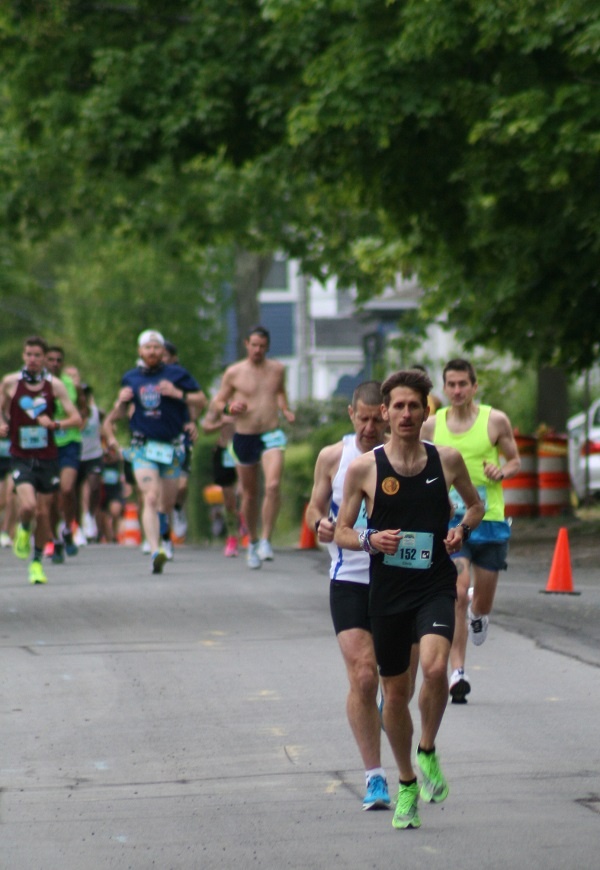
Disclosure: This article may contain affiliate links. When you buy through links on our site, I may earn an affiliate commission. As an Amazon Associate I earn from qualifying purchases.
Introduction – My History in the Marathon
Getting to the starting line of the 2021 Newport Rhode Races Marathon in breathtaking Newport, Rhode Island was in itself a long, long journey. My first road marathon was the 2018 Sugarloaf Marathon in Central Maine. It was for this race that I hired my first running coach and started my quest to qualify for the Boston Marathon.
Like many ambitious runners, I was cocky enough to think that I could qualify for the Boston Marathon in my first ever attempt at the 26.2 road distance. My training went fantastic, my relationship with my coach and belief in myself was strong, but the distance humbled me. By mile 20 my legs were so beat up from the perpetual downhill course that they grew stiffer and stiffer, shortening my stride until I was ultimately forced to walk. My goal of running a 3:05 BQ in my first marathon slipped away but through sheer will, I managed to cross the line in 3:14:25 for my first marathon.
Humbled by the distance, but now with a fire to BQ kindled hotter than ever, I reset and refocused my attention on the 2018 Baystate Marathon. I took the invaluable lessons I learned in the spring into my fall training block. I increased my peak mileage from in the 50’s to in the 70’s-80’s per week, focused my training on race-pace specific workouts, and became religious about practicing helpful supplemental habits for runners, like strength work, foam rolling, and prioritizing rest. My hard work paid off, and I ran a very strong and consistent 2:56:29 all the way from the start through the finish line.
I had qualified for the Boston Marathon in my second marathon. I was so proud to have reached that high standard that so many skilled runners dream about and strive for. I was going to the Common Man’s Olympics!
Because my 2018 Boston Qualifying time was run in a month where I could not enter the Boston Marathon until 2020, I decided to not run the 26.2 distance in 2019 and instead focus on getting faster. 5K, 10K, and Half Marathon Races became my goal and I continued to improve my strength and endurance, capping off the year with a 1:14 half marathon at the Fall 2019 Hannaford Half Marathon in Albany, New York.
I was well into training for Boston 2020 and running some of my highest mileage ever when the Covid-19 Pandemic hit New England hard and the BAA and City of Boston canceled the race. The marathon was rescheduled to the Fall in hopes the public health situation would improve by then, but alas the race was canceled again and not held for the first time in its 124 year history.
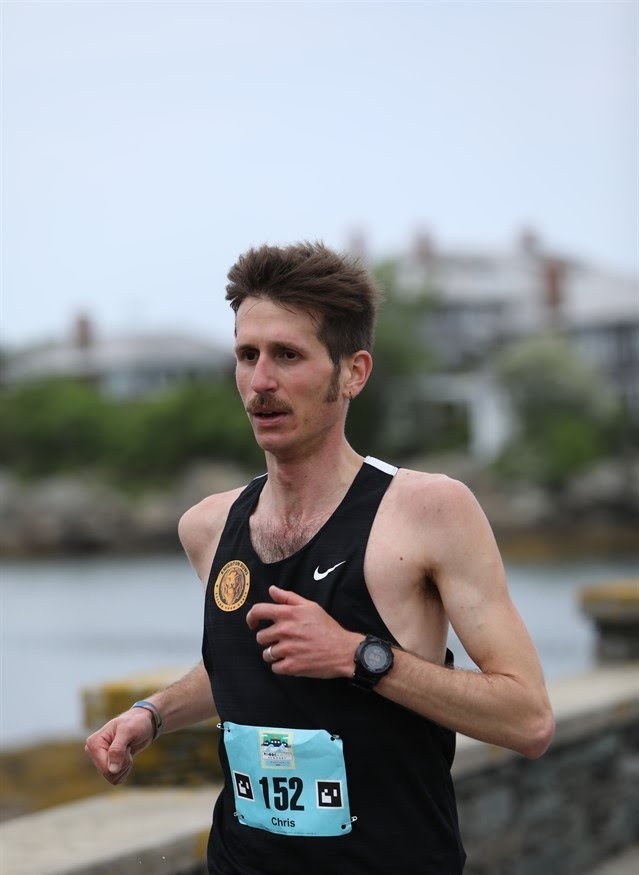
Training for the Newport Rhode Races Marathon
In January 2021, I discovered that Rhode Races would be hosting the Newport Marathon in April and quickly signed up. It had been over two years since I last ran 26.2 miles, and my fitness had greatly improved over that time. I was now looking at realistically training for a low 2:40 marathon, which would be about a 15-minute PR from my previous best of 2:56.
My training went well. No training block is perfect, and I certainly had my ups and downs. About a month before the race was scheduled to take place, I learned it would be postponed six weeks till late May. This was a challenge to adapt to knowing I’d need to extend my peak fitness for longer but did allow me valuable extra time to train. All and all I had a very strong base building phase, had great workout consistency during my speed development phase and maintained 70-mile weeks for the final three months before the race. For the most part, I had no trouble completing my workouts, running was feeling good, and I was confidently ready to race 26.2 in Newport, Rhode Island this May.
My goal for race day was to run under 2:45, with an aim to be closer to 2:40 on a perfect day. I set my goal pace at 6:10 based on my experience in marathon-paced long runs and extrapolation from recent racing times at other distances, like my April 10K at Pomham Rocks.
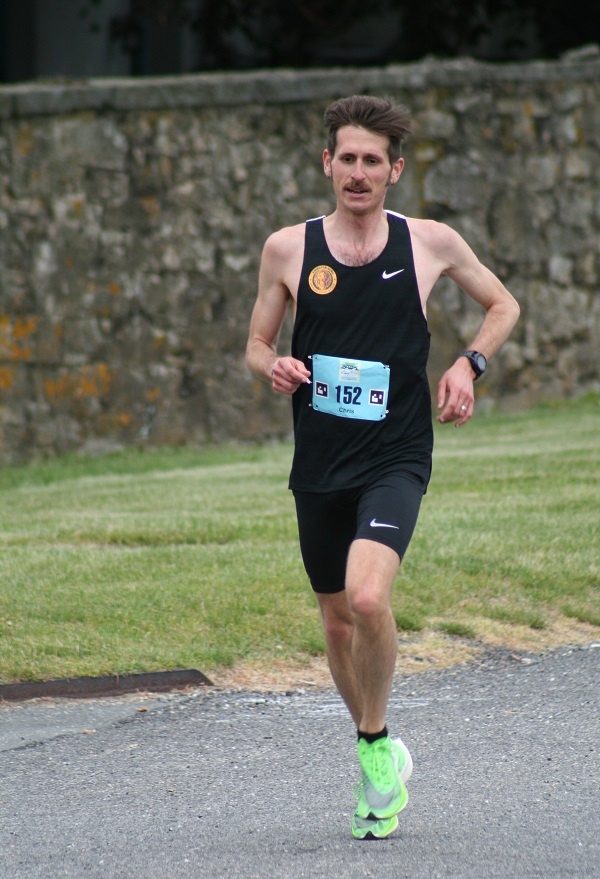
The Race Recap – Newport Rhode Races Marathon
As the Newport Marathon kicked off, I found myself running with several friends from The Heartbreakers and The Central Mass Striders running clubs, but we strung out quickly. The first two miles were hilly. Mile one had a long gradual uphill from the beach into the nearby neighborhoods. Mile two dropped down into town subtly but clearly quickly as I easily clocked off my fastest mile of the race (a 5:50) despite my best intentions to not push so soon in the race.
I was honestly amazed by how good I felt in the first ten miles. The course which winds along the breathtaking beaches and passed the grandiose historic mansion estates of Newport was by far the most pleasurable course I have ever competed on. The course was rolly, but none of the hills ever felt like they slowed me down. I love a windy, rolling course and felt like I could settle into a comfortable effort and just coast along clicking off 6:10 after 6:10 mile.
However, I had not run a full 26.2 miles in over two-and-a-half miles and it started to show. The race quickly strung out, and after two miles I was running alone. After an hour of running alone at a quick tempo, boredom started to creep in. Knowing I still had over an hour of running to go before even making it to mile 20, I tried my best to just clear my head, not get excited, zone out and focus on the moment. A marathon is a long way.
Coming through the Half Marathon in 1:20, I was feeling great but starting to realize just how much the marathon is a battle of attrition. After mile 13, I started to notice slight niggling sensations in my calves. I could keep running my pace, and in fact, it felt quite easy, but I knew that the onset of cramping was coming on.
Mile 15-17 consists of an out-and-back along the exposed “Second Beach,” turning around just before the Sachuest Point National Wildlife Refuge. This section of the course was more exposed to wind and sun than we had faced before, and was the start of my decline. My pace started slipping slightly and I started to notice a bit more unusual sensation in my legs. I still had fantastic energy, but the fast mileage seemed to be taking a toll on my muscles.
Up until this point, I was in 5th place during the race, but in Mile 19 I had my first runner catch up to me and pass me. We chatted for a bit, both feeling aerobically strong. I commented that I was feeling good but could sense cramping coming on and was trying my best to fend it off. He commented that it felt a lot hotter than he expected. To be honest, I didn’t feel the heat. I felt pretty darn good.
Cresting the 70ft hill, my watch buzzed 6:50, slower than any mile so far, but nothing I was worried about. I was exactly on the pace I wanted to be for the first 20 miles and had a huge lead over my previous personal best. Even a big fade at the end would surely result in a massive PR for the day. I checked my watch and told myself I only had 40 minutes more running to do. I closed my eyes and soldiered on. I told myself I could do this.
Coming down the backside of the mile 20 hill, I took one step, much like I had taken tens of thousands up to this point and something terribly wrong happened. My right calf locked up with a full-on Charley Horse cramp. I went from sub-6:00 pace downhill to stopped dead in my tracks with a single plant of my right leg. With me bent over and unable to move, my Heartbreaker Teammate passed by looking strong. He asked me if I was okay, I said I was… just cramping. It was at this point that I knew my race was effectively over.
I managed to undo my calf cramp and resumed running. First slowly jogging but then was able to resume a sub-7:00 / mile pace. While I could no longer run my pace, for a couple of miles, I felt like it might just be possible to cruise into the finish with a respectable time. Unfortunately, things went from bad to worse.
My cramping only got more severe and more painful with time, over the last 6.2 miles of the race my legs completely locked up at least 6 times. Twice drivers pulled over, alarmed by how crippled I looked, and offered their assistance. A non-stop stream of marathoners passed by me, sending me their words of encouragement. Just getting to the finish so the race could be over was my only goal at this point.
It wasn’t pretty. I walked a ton. I stopped a ton. It hurt a ton, but I finally hobbled across the finish line in 3:05. My second fastest marathon out of the three I had now finished. Truly humbled by the distance, I ran the fastest 20 miles of my life, followed by the most pitiful 6.2 of my life. I road the line and got whipped. The finish line volunteers were so nice and so encouraging though that I couldn’t help but smile as I crossed the line and they handed me my medal. 2:40 will have to wait. I know I have the fitness. The pace never felt hard and I never got tired, but extreme cramping got the best of me. There is more work I can do to strengthen my muscles for next time.
This was my first “bad race” in a long time. It wasn’t the race I wanted, but perhaps it was the race I needed.
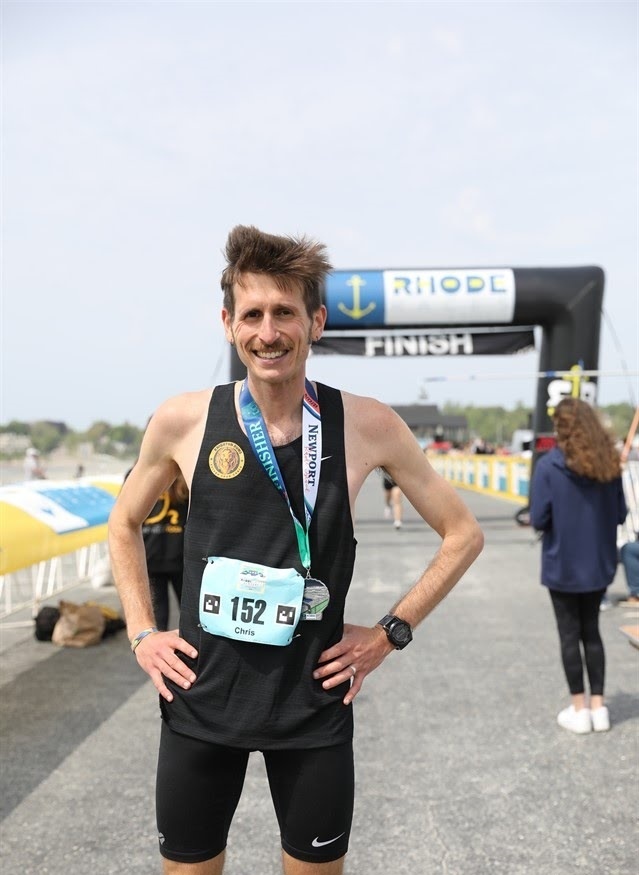
Takeaways – What did I learn from the Newport Marathon?
- Limiting Factors – The limiting factor in the marathon is not aerobic fitness, it is physical endurance. 6:10 pace felt incredibly easy for me today. It was sheer muscle failure that ended my race at mile 20. My race times at 5K to Half Marathon easily translate to a 2:40 marathon. My aerobic cardiovascular system was more than ready to take on this pace, but my body was not ready to handle the pounding of 26.2 miles at 6:10 per mile. For my next marathon, I will remember this and focus more on regularly practicing marathon pace long runs on course-specific terrain. I will put more of an emphasis on strength training my lower legs.
- Logistical Planning – The logistical planning that goes into shorter distance events also works well for a marathon. I’ve gotten good at dialing in how to prepare logistically before a race. I don’t need to overthink it now.
- Fueling – I took 5 gu gels over the course of the marathon (approximately every 25-30 minutes) and felt like I had high energy throughout the entire race. My marathon fueling felt on point. I never bonked. My glycogen stores felt high the entire race. I will fuel like this next time as well.
- Cramping is my weakness – Based on my research, severe cramping is a symptom of uncontrollable muscle shutdown that tends to affect some marathoners and not others. If I simply faded energy or got sore in the last 20 miles of my race, I would have no doubt been able to “hold on” and run into the finish with slightly slower mile splits. Unfortunately, the complete cramping of my legs made running absolutely impossible for me and destroyed any chance of saving my race in the last 10K of the marathon. I need to prepare for this possibility specifically in the future.
3 Strategies for Preparing For and Overcoming Cramping in My Next Marathon
- Condition my Legs for the Specific Demands of the Marathon – Focusing more on workout long runs. This marathon block I did not complete any long runs with over 10 miles at Marathon Pace. In hindsight, I view this as a mistake. For future training, I will put more emphasis on long runs with 12 to 16 miles at marathon pace and consider adding in workouts that require “recovering” at marathon pace.
- Conservative Negative Split Pacing – The marathon doesn’t start until mile 20. Had I run 6:20 pace average for the first twenty miles, I may never have cramped. Instead, I tried to ride the line for the entire race with even splits. If you start a race conservatively you can usually close fast, but it’s very hard or impossible to recover from going over the line too soon.
- Be Prepared with Anti-Cramp Elixer – As someone with a history of having races going horribly wrong due to the onset of cramps, I plan to start experimenting with Anti-Cramp Sports Products on the market such as HOTSHOT or CrampFix. In my research on how to overcome extreme marathon cramps, I found numerous stories of runners who used these products to great success, some claiming their cramps went away after seconds of taking the product. While experimenting with these products will be required on my end, I have no doubt that I would have completed the Newport Marathon in my goal time in the 2:40’s had I be able to eliminate my cramping. All of my other systems were still functioning near 100% when my legs seized up, so I’m definitely interested in using these products.
What challenges have you had to face on Marathon Race Day?
Have you dealt with extreme cramping during races before?
How have you overcome these challenges?
Let me know in the comments below.
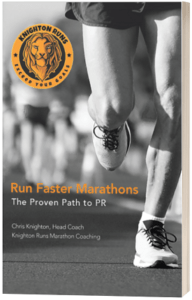


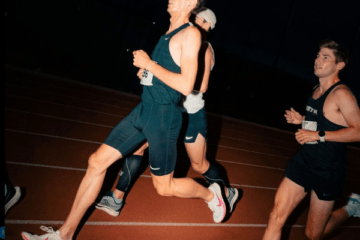
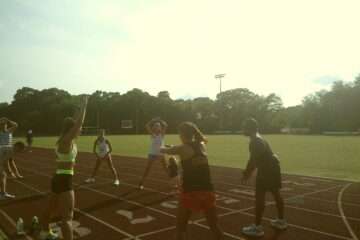
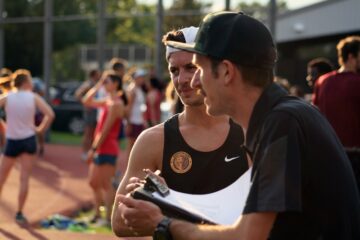
4 Comments
Kyle Kranz · May 25, 2021 at 3:52 PM
Is that a smile or a grimace in your photo there at the end? 😉
Nice running and thanks for the detailed recap, Chris! Not the day you had hoped, but like I said after my marathon, “one bad day over the course of a great training block is still a great training block.”
Coach Chris · May 25, 2021 at 4:49 PM
Hahaha, it’s a real smile. I was feeling defeated and anti-social when I crossed the finish line and not enjoying the cheers from the folks at the finish, but after I crossed the finish line they handed me my medal and there was a photographer there snapping finisher portraits. I never had that happen at a race before and it was really sweet. Cheered me up right away and made me smile.
Tim Cronin · May 26, 2021 at 12:59 PM
Sorry to hear the day didn’t go as you hoped, but thanks for the great recap, Chris! I think regarding your take-away point 1) — one of the big challenges of the marathon is that there are so many possible limiting factors that can be . Some runners are limited more by aerobic endurance, others by fueling or hydration, others by cramping or other muscular failure/fatigue, and even things as mundane as GI distress can kill a marathon! Furthermore, these can all interact — the classic marathon failure of hitting the wall is about aerobic endurance not being great enough (for the targeted pace) combined with inadequate fueling or too little topping up of muscles due to poor tapering. In your case, as you discuss, cramping was also probably a story with multiple parts — I hope to see you overcome it and hit your 2:40ish goal next time!
Coach Chris · May 27, 2021 at 2:03 PM
Thanks, Tim. Great insights here. The myriad of things that can go wrong and end a marathon sometimes make it hard to pinpoint a reason “why”.
Comments are closed.